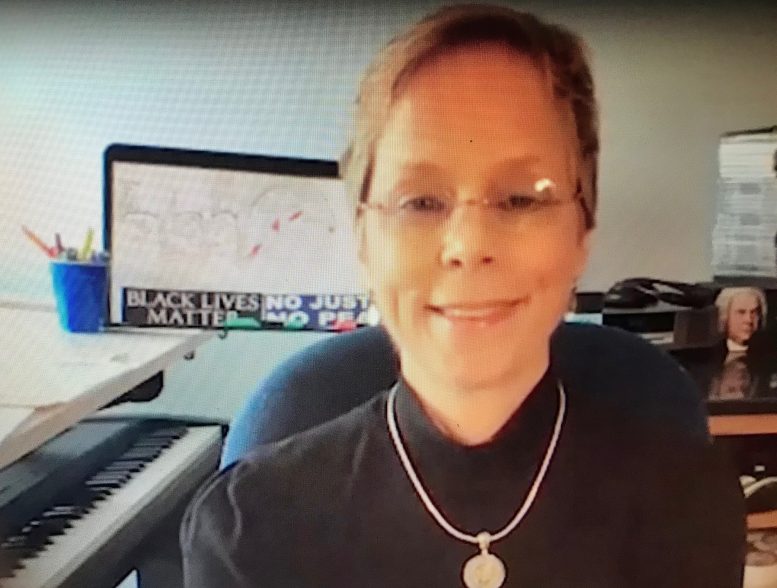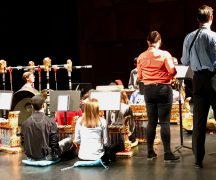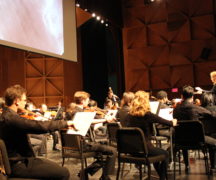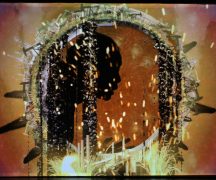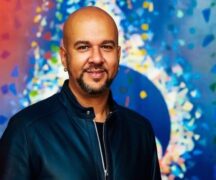By DAVID DUPONT
BG Independent News
Composer Augusta Read Thomas worked her way from the bottom to the top in music.
Now a widely acclaimed composer, a professor at the University of Chicago and resident composer with the Chicago Symphony, Thomas started out in music underneath the family piano, listening whenever someone played. She also started her own journey creating music with a few plinks on the keys.
That was back when she was a toddler, the youngest of 10 children.
Thomas shared this autobiographical tidbits Thursday in a recorded conversation with Kurt Doles, the director of the MidAmerican Center for Contemporary Music at Bowling Green State University.
Thomas is the featured guest composer for the New Music Festival on campus. The festival, in its 41st year has adopted an online format. The composer’s talk is the traditional opening of the festival, which continues with premieres of four recorded performances, each including music by Thomas on the program.
Tonight (Oct. 16) at 8, the Third Coast Percussion’s performance will remain up on its YouTube channel for another week. The other performances (Oct. 15, Saturday Oct. 17 at 2:30 p.m., and Sunday, Oct. 18 at 8p.m.) will be archived on the College of Musical Arts’ YouTube channel.
Thursday’s performance featured three pianists – Yuefeng Liu, Ariel Magno Da Costa, and Steven Naylor—each performing two pieces from Thomas’ Piano Etudes.
The recordings are more than the usual single camera livestream. Michael Laurello, director of recording services at the college, uses dramatic lighting and several camera angles including closeups to capture the performances.
Once Thomas had progressed from being under the piano, she began taking lessons. Her mother, who supported the family as a kindergarten teacher for about 30 years. She was also an amateur pianist who encouraged her daughter’s love of music.
Her father, who was separated from her mother, did as well. He would not allow the children to watch television. Instead he would make them listen to Bach, Thomas said. At age 7 or so she realized: “Wow, this is pretty good.”
She became obsessed with the composer. “Bach is a great composition teacher.”
In fourth grade, she took up trumpet. She didn’t plan to, but on the day when instruments were assigned, the students were lined up in alphabetical order and by the time her turn came to select an instrument trumpet was one of the few left.
Thomas excelled and ended up playing in select honors ensembles before going to Northwestern where she was a trumpet performance major. She had started composing as a child. “I had written an enormous amount of music.”
During her college years she attended the Tanglewood Summer Festival in Massachusetts where she worked with Oliver Knussen. She later attended Yale to study composition for a year before going to England on a fellowship.
She told Doles, she never completed her master’s degree, but launched into her career.
Thomas said her years of experience as a player and as a singer has influenced her work. “I bring all that to my composition,” she said. “I’m completely empathetic to the player.”
Speaking from her Chicago studio, she described her process. An early riser, she’s at work by 4 a.m. She has been working for 15 hours a day since she was 15, she said.
“I usually start with that deep desire to make something,” she said. “I always improvise. I scat. I sing. I dance. I play the piano, and I try to find unexpected things.”
Once she’s mined that material, she dreams about it, and locates what is most personal to her.
Then “it starts to get very intentional and very precise,” Thomas said.
“My scores are very nuanced in terms of articulations, dynamics, tempos,” the composer said. She uses very “very intricate notation out of respect for the player, so they can take all their expertise and make magic.”
Her compositions are about music itself, more than any outside inspiration. “I’m much more about writing this organic music that’s bubbling up,” she said. “The pieces are really about music. They’re about harmony and counterpoint, hockets and color and balance and flow and flux and form and density and empathy with the musicians, and all the other thousand parameters of music. That’s where I live.”
Third Coast Percussion will premiere her piece “Con Moto” tonight. The composition uses “five quartets of colors.” It calls on the four members each to play a variety of keyboards, drums of different styles and pitches, triangles, chimes, and shakers. And she has them move quickly among those instruments.
“This piece is a little jazzy and kind of whimsical and dance-like at times,” she said. “It opens up to a more reverberant place.”
Thomas visited campus several years ago as he guest composer for the annual Toledo Symphony Student Composer Reading Session. She praised the event in which students get to hear a professional orchestra play their work.
Thomas said she was “humbled” to be chosen as featured guest composer for the New Music Festival.
“I think the festival that you run is exceptional and really important.”
Doles said he was glad they were able to stage the event even in “truncated form.”
It is testament to the commitment in the College of Musical Arts “that we’re able to power through current events and present a positive experience for our faculty and students and the world out there.”
Thomas, who founded Center for Contemporary Composition at the University of Chicago, said: “Arts really matter. When we look back at civilization, we look at what artists made. We look at the cathedrals, and we look at the monuments and we look at the frescos and look at the cave paintings. That’s what we look back on, trying to understand former civilizations and humanity. It’s important that artists are supported and able to do their work.”

